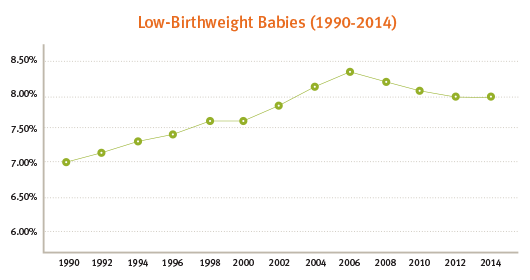KIDS COUNT Checkup: A Look at Low-Birthweight Babies

Researchers have long tracked the birthweight of babies as a measure of population health.
A low birthweight, which experts define as babies born weighing less than 5.5 pounds, is associated with certain immediate and long-term health risks. For instance, low birthweight babies are more likely to experience respiratory distress and brain bleeds as newborns and develop diabetes, heart disease and high blood pressure later in life.
Today in America, about 1 in 13 newborns — 319,000 babies total — is born at a low birthweight. This statistic has fallen by more than 28,000 newborns in the last seven years, according to the KIDS COUNT Data Book. Despite this progress, American women are still more likely to have low birthweight babies relative to their counterparts in other affluent countries.
At the state level, Mississippi has the highest incidence of babies born at a low birthweight (about 1 in every 9) while Alaska has the lowest (1 in every 17).
Visit the in the KIDS COUNT Data Center for new birth data at the state and national level:
- Total births
- Total births by race and ethnicity
- Teen births by age group
- Teen births by race and ethnicity
- Teen births to woman who were already mothers
- Births to unmarried women
- Births to foreign-born mothers
- Preterm births
- Very low-birthweight babies
- Low-birthweight babies
- Low-birthweight babies by race
- Births to woman receiving late or no prenatal care
- Births to woman receiving late or no prenatal care by race and ethnicity
- Births to mothers with less than 12 years of education
- Births to mothers who smoked during pregnancy







